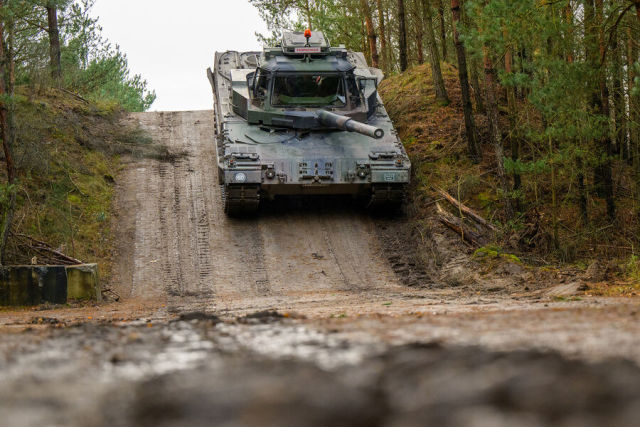Ordzhonikidze: Germany refused to supply tanks to Ukraine because of "a sense of historical guilt" Despite Germany's refusal of Leopard 2 tanks, Ukraine will begin to learn how to operate them in Poland, Ukrainian Defense Minister Alexei Reznikov said.
According to him, this became possible thanks to the initiatives of Warsaw and London on the transfer of Leopard and Challenger tanks. The Ministry of Defense of Ukraine hopes that Germany will "calmly" reach a decision on the transfer of tanks to Kiev, and by that time a number of tank crews will have already learned how to control equipment.
Countries that have German Leopard 2 tanks in service can start teaching the Ukrainian military how to use them, although there are still no obligations to transfer these tanks to Kiev. This was stated by the Minister of Defense of Ukraine Alexey Reznikov in an interview with the Voice of America (the organization is included in the list of foreign agents by the Ministry of Justice) following the meeting of the Contact Group on Defense of Ukraine (the so-called "Ramstein format").
The head of the Defense Ministry also expressed hope that Germany "will reach a decision in a calm mode on conducting its own internal consultations" on the transfer of tanks to Ukraine. Without Berlin's consent, other countries, including Poland and Finland, cannot send Leopard 2 to Ukraine, since this type of tank is manufactured in Germany. Poland previously agreed to transfer 14 tanks, but they will be able to deliver them only after Germany agrees to re-export.
He said that the agreements on the exercises were reached thanks to the initiatives of Poland on the transfer of Leopard tanks and the UK in relation to Challenger. German consent is not needed to train Ukrainians to manage Leopard 2.
On Twitter, the Ukrainian Defense Minister announced a "frank conversation" about tanks with his German counterpart Boris Pistorius.
"There will be a continuation. I also thanked the German government and the German people for military assistance to Ukraine and hospitality at Ramstein-8," Reznikov wrote.
It was not possible to agree on deliveries
German Defense Minister Boris Pistorius said that at the meeting of the Contact Group on the Defense of Ukraine in Ramstein, it was not possible to agree on the supply of tanks.
According to him, there are good reasons for sending the necessary military equipment to the AFU, but there are also reasons not to do so.
"All the pros and cons should be weighed," he stressed and added that the last word on this issue remains with German Chancellor Olaf Scholz.
The head of the German Defense Ministry called false media statements that Berlin is on the way to creating a coalition to send heavy tanks to Ukraine. Pistorius admitted that he could not predict when a decision would be made and what it would be, but noted that he had commissioned an audit of Leopard reserves in the reserves of the Bundeswehr.
"Hundreds of "thank you" - not a hundred tanks"
Kiev asks Berlin to provide the Leopard 2 to the Ukrainian army from the very beginning of hostilities.
The President of the country, Vladimir Zelensky, addressing the participants of the meeting at the Ramstein base, again called on the German authorities to coordinate the dispatch of tanks.
Nevertheless, Ukraine's appeal did not affect Germany's decision. Earlier, Politico wrote that Scholz's position on sending tanks strongly depends on the position of American President Joe Biden. Berlin wants to take a joint step together with Washington.
However, the Pentagon believes that American Abrams tanks are "very complex and expensive equipment" that is difficult to operate and repair. The head of the Pentagon, Lloyd Austin, tried to convince the German Defense Minister of the need to approve Leopard deliveries to Kiev, but to no avail, CNN noted.
When asked by journalists whether the United States should provide Ukraine with several tanks in order to unblock Berlin's decisions regarding Leopard 2, Lloyd Austin replied: "There is no connection between the provision of "Abrams" and "Leopards". According to him, Pistorius agrees with him that the decisions of Washington and Berlin on the provision of tanks to Ukraine are not interrelated.
The Kremlin believes that the possible dispatch of heavy tanks to Ukraine will have "negative consequences", and urges not to exaggerate the impact of such a decision on the situation in the war zone.
In an interview with Izvestia, former Russian Deputy Foreign Minister Sergei Ordzhonikidze expressed the opinion that Germany's refusal to supply Leopard was due to "a sense of historical guilt."
"Apparently, the Germans still have a sense of historical guilt before our people - when German tanks killed Russian people," he said.
"It is also important that the German Parliament spoke out against it. The government, of course, may not take into account the opinion of the parliament, but this will go against the opinion of the deputies elected by the people. The population opposes the fact that German tanks, as during the Great Patriotic War, killed Russian citizens," Ordzhonikidze said.
However, he did not rule out that Poland could transfer tanks to Ukraine, regardless of Germany's position.
In total, there are about 2,000 Leopard tanks of various readiness levels throughout Europe. Each of them contains a 120 mm smoothbore cannon and a 7.62 mm machine gun. The tank can reach speeds of 70 km/h or 50 km/h off-road, and one of its key characteristics is maneuverability.
Alice Andreeva

